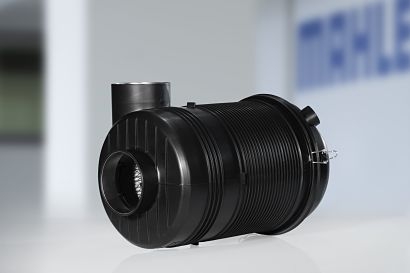
Developers now have direct access to a fully developed ‘off-the-shelf’ component instead of having to design individual solutions for each vehicle. The new air filters for cells with an output of 25–50 kW or 80–120 kW reliably protect fuel cells from harmful gases and particles, ensuring the operation of the fuel cell over the entire service life of a vehicle and minimizing the use of expensive catalysts.
With this new approach, Mahle aims to bring the suitability of fuel cell technology for the mass market a significant step closer. Hydrogen and therefore fuel cells themselves are important elements of the company’s development work toward CO2-neutral mobility.
“Mahle has extensive expertise in air filtration, which we’re now benefiting from in the development and production of reliable filter solutions for fuel cell vehicles” said Dr. Martin Berger, head of Corporate Research and Advanced Engineering at Mahle. “By making the design of the air tract simpler, faster, and cheaper with our new standardized approach, we’re bringing the suitability of this future technology for the mass market a significant step closer.”
Fuel cells contain platinum as a catalyst. It is used to convert hydrogen and oxygen into water, with the energy generated in the reaction being released in the form of electrical energy. The fewer harmful gases entering the cell, the less platinum is needed to ensure that it remains operational over the service life of the vehicle. Platinum is rare and expensive, so using efficient filters to increase the degree of purity of the supply air means lower manufacturing costs.
In order to reliably protect fuel cells and thus make them attractive to the consumer from a price perspective, Mahle relies on a highly effective filter medium consisting of several layers: a substrate material ensures mechanical stability, while a particulate filter layer blocks 99.9 percent of unwanted particles. A molecular layer prevents ammonia from entering the fuel cell, an activated carbon layer absorbs unwanted hydrocarbons, and an additional, specially impregnated activated carbon layer stops sulphur dioxide, hydrogen sulphide, and nitrogen oxides from reaching the cell.
Mahle uses its holistic systems competence in thermal and air management, power electronics, and filtration to support the development of vehicles with fuel cell drives that are suitable for large-scale production. The focus is on lower systems costs coupled with higher operational safety. The company is developing a fuel cell systems portfolio featuring a modular approach based on its current range of components, thereby helping to reduce technological barriers and improve the suitability of vehicles with fuel cell drives for the mass market.
For additional information:

